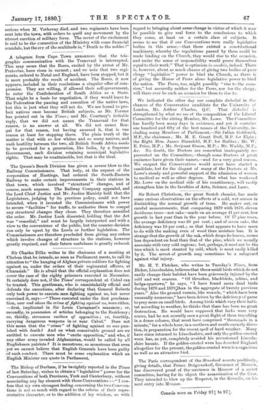The Bishop of Durham, if he be rightly reported in
the Times of last Saturday, wishes to obtain a "legislative" power for the Convocations of both Provinces, York and Canterbury, without associating any lay element with those Convocations :—" I con- fess that my own strongest feeling concerning the two Convoca- tions is not so much with regard to the reform of their repre- sentative character, or to the addition of lay wisdom, as with
regard to bringing about some change in virtue of which it may be possible to give real force to the conclusions to which they come, at least on a certain class of subjects. It seems to me that if our Convocations were really legislative bodies in this sense,—that there existed a constitutional machinery; whereby the regulations passed by them could be made binding on the Church, they would rise to the occasion, and under the sense of responsibility would prove themselves equal to their work." That is optimism in &waists, indeed. There is, however, about as much chance of giving two bodies of pure clergy " legislative " power to bind the Church, as there is of giving the House of Peers alone legislative power to bind the nation. The Peers, too, might possibly "rise to the occa- sion," but assuredly neither for the Peers, nor for the clergy, will there ever be such an occasion for them to rise to.


































 Previous page
Previous page